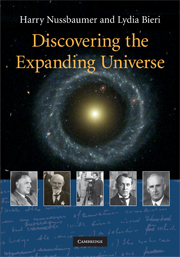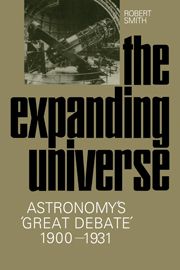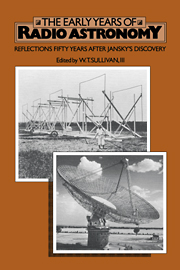Star Noise: Discovering the Radio Universe
Until Karl Jansky's 1933 discovery of radio noise from the Milky Way, astronomy was limited to observation by visible light. Radio astronomy opened a new window on the Universe, leading to the discovery of quasars, pulsars, the cosmic microwave background, electrical storms on Jupiter, the first extrasolar planets, and many other unexpected and unanticipated phenomena. Theory generally played little or no role – or even pointed in the wrong direction. Some discoveries came as a result of military or industrial activities, some from academic research intended for other purposes, some from simply looking with a new technique. Often it was the right person, in the right place, at the right time, doing the right thing – or sometimes the wrong thing. Star Noise tells the story of these discoveries, the men and women who made them, the circumstances which enabled them, and the surprising ways in which real-life scientific research works.
- Describes, through real-life examples, the complex interactions among theory, observation, skill, having the right equipment, along with luck, that lie behind the historical radio astronomy discoveries
- The major discoveries in radio astronomy are given in everyday language, to make them accessible for educated readers interested in astronomy, radio electronics, or the history of science
- Includes the personal backgrounds and interactions among some of the key scientists responsible for the major discoveries, to show how personalities, collaborations, and conflicts affect scientific research
Reviews & endorsements
‘This is a wonderful book, accessible to most college undergraduates! Its photographs and biographical sketches introduce some of the world’s most competent, best-informed radio astronomers, and reveal how these researchers almost always lost their way, repeatedly, before ultimately arriving at a deeper understanding of the Universe. In describing this process, Kellermann and Bouton also depict the Cosmos, as observed today, and sketch how it may have evolved over the eons.’ Martin Harwit, Professor Emeritus of Astronomy, Cornell University
‘This book presents a history of radio astronomy from the unique perspective of authors close to important developments in the field. It not only describes the historical developments but provides a wealth of entertaining stories. Kellermann was on the scene or one degree removed from the events described as a PhD student of John Bolton, a leading pioneers in radio astronomy after World War II. These stories, which are related in colorful detail and accompanied by copious photographs, are told with such a flourish that makes the book hard to put down. The conclusions provide an object lesson about the nature of scientific discovery and how science really works. Scientists, students, and people who influence which instruments are built and who gets to use them will enjoy and benefit from reading this book.’ James M. Moran, D. H. Menzel Professor of Astrophysics Emeritus, Harvard University and Senior Scientist, SAO
‘Respected radio astronomer Kellermann and archivist/historian Bouton make the ideal team to write a history of radio astronomy that is not only well informed and accurate but goes further in revealing the twists and turns of discoveries that were often accidental and unrecognized at the time. … Highly recommended.’ K. D. Stephan, Choice
‘… a useful and entertaining history of radio astronomy from the earliest days up to the present … full of colourful detail, often including anecdotes which have not been told before and do not appear in the scientific journals. … Altogether a fascinating and enjoyable book especially for one who has been involved or a spectator in the whole subject.’ Francis Graham-Smith, The Observatory
‘An important and substantial contribution to the history of what is known today as multi-messenger astronomy.’ Stephen J. Dick, Metascience
Product details
April 2023Adobe eBook Reader
9781009021210
0 pages
This ISBN is for an eBook version which is distributed on our behalf by a third party.
Table of Contents
- Foreword
- Preface
- Introduction
- 1. A new window on the universe
- 2. Radio emission from the sun and stars
- 3. Radio galaxies
- 4. Quasars and AGN
- 5. Radio astronomy, cosmology, and cosmic evolution
- 6. The Cosmic Microwave Background
- 7. Interplanetary scintillations, pulsars, neutron stars, and fast radio bursts
- 8. Interstellar atoms, molecules, and cosmic masers
- 9. Radio studies of the moon and planets
- 10. Testing gravity
- 11. If you build it, they will come
- 12. Expecting the unexpected
- End notes
- Glossary: Abbreviations and acronyms
- Bibliography and suggested reading
- Index.








